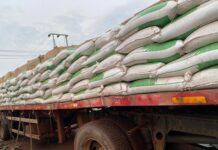There is no doubt that the just-ended year, 2021, has been a difficult agricultural year. Data from the Statistics, Research, and Information directorate of the Ministry for Food and Agriculture shows that between January and October 2021, the prices of major food crops like maize, yam, cassava, tomatoes, and rice increased between 12 and 73%.
This means that it was difficult for people to buy the foods they needed to get satisfied and healthy.
The contributory factors include poor management of the sector and external shocks. Here, the reference is poor management situations like the delayed release of funds for major policy interventions like the Fertiliser Subsidy Programme, external shocks like Covid-19 disruptions to the global agriculture supply chain and climate change.
The challenges with poor management of the sector have always been unabated. They did not start today. Fixing them requires clearly thought through policy initiatives, and enhanced commitment from the government and the various stakeholders to develop the sector.
In this statement, GARDJA offers 5 suggestive measures to the government that would help to improve the agricultural sector which we are confident if taken seriously Ghana would be self-sufficient in food production.
An improved agricultural sector would help provide the teeming youth of the country with the necessary jobs that can help to improve their lives.
First of all, there should be a proper decentralization of the management of Ghana’s agricultural sector. The government’s to decentralize the departments of agriculture across the country to be accountable by the local assemblies through the local government system is laudable. But that means nothing if conscious efforts are not made to channel resources directly from the central government to these district agricultural department offices, the problem would linger on.
The local assemblies should prioritise agricultural activities and make sure they provide adequate investments at the local levels to support farmers in the enclaves. Financial resources are needed to finance the transportation and logistical needs of extension officers so they could get research outputs, science and technological innovative ideas to the farmers. The local government system must support financially.
Secondly, the government needs to improve the life of smallholder farmers. It is inappropriate that government-funded initiatives like the School Feeding Programme sometimes rely on imported food products. The local agricultural economy must be propped with local and national government funding. There must be a conscious effort by the state at the national and local level to create conducive environments for the marketing of farm produces for the benefit of Ghanaian farmers.
Thirdly, the state should protect the farmlands from the Real Estate developers in the country. In semi-urban areas, estate developers have vigorously taken over agricultural lands, forcing smallholder farmers out of work. Whereas in the rural areas, there is a creeping culture of food crop farmlands being taken over by commercial farmers like rubber farming companies, which have the potentials to negatively influence the impact of food production in the country. The government must intervene and properly zone out farming lands that should be no–go areas for the real estate developers and commercial farmers.
With the impact of climate change, the government is urged to improve the country’s irrigation system and revive the abandoned projects of the failed One-village One-dam Policy. As farmers across the country have observed, the policy has created nonexistent and useless dams that haven’t made any difference in their lives.
The concept of providing farmers with irrigation facilities is a good move that must necessarily be pursued to the very latter. But clearly, the One-village One-dam initiative is mismanaged in a way that prioritized special interest benefits over the interest of the farmers who feed the country. Now, this is the time for a more effective revitalization of the initiative for the benefit of the farmers.
Finally, development partners and agencies that support Ghana’s agricultural sector need to improve the level of involvement of farmers in the planning and implementation of their projects. There should be proper development systems for measuring the impact, sustainability, and quality of exit strategies for these projects, and properly integrating them into Ghana’s home-grown agricultural policies and programmes. A lot of these agricultural projects have been running for years with little to show as evidence of success.
There are more agriculture NGOs operating in the north saying they are working to improve the lives of the farmers to encourage the youth into the sector, yet migration from North to the South continues to skyrocket. There must be a coordinated platform among the civil society organizations in the agricultural sector so they could work together for the benefit of the farmers.
These ideas enumerated above are actually nothing new, they revolve around the same ideas been tossed around over the years. Urgent action needs to be taken to improve the agricultural sector. Minus immediate bold interventions, 2022 is likely to come along with an even more drastic increase in prices of foodstuff, deepening inequalities among the farming population and an increase in Ghana’s dependence on foreign foods, as well as loss of agricultural jobs. The government need to take immediate action now.
About GARDJA
The Ghana Agricultural and Rural Development Journalists Association (GARDJA) is an association of about 300 journalists and communicators working to promote issues of environment, agriculture and rural development in the media space. GARDJA is an affiliate of the International Federation of Agricultural Journalists (IFAJ), the world’s largest association of agricultural communication practitioners with membership covering more than 50 countries.








